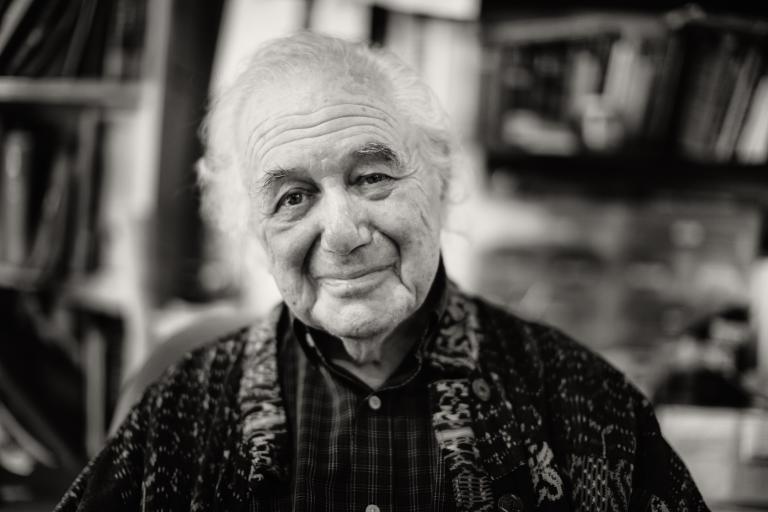
I once read a story about a scientific researcher who was studying a group of Tibetan monks who meditated for hours each day. He began strapping electrodes to the heads of the monks to measure their brain waves—which the monks found uproariously funny. The researcher asked, “Why are you all laughing?” One monk sheepishly replied, “because the mind is not up here” (pointing to his head), “the mind is in here” (pointing to his heart).
I was reminded of this tale while reading What Is GOD? by Jacob Needleman, the late philosopher and author (1934-2022). He recounts his years as a college religion and philisophy professor when he would spend his days and nights thinking about the existence of God. The more he immersed himself in the subject, the more he “could not accept that the universe was as empty of purpose and consciousness as science described it.”
Needleman begins to wonder: Is the brain the only way to find God? He notes that “the fundamental teachings of the great spiritual traditions and philosophies of the world are rooted in the disciplined work of inner empiricism.” Our own sensory experience. He wonders if the Western world is putting too much stock into science which knows nothing of the inner life and “demands that we base all our knowledge upon actual (external) experience.”
He comes to a firm conclusion: “The discipline of inner experience is as precise and undeniable as the facts brought to light by the sensory experience of the external world.” In other worlds, our thinking brain, “the logical, analytical organ in the head,” isn’t the place to detect the presence of God. We must sense God with our whole being—the feeling in our hearts, bodies, and souls. Information that is every bit as valid as what’s in our heads.
Needleman gets us to look at God from a fresh perspective.
In past writings, the philosopher has suggested that God is not a being outside of us, but rather an inner potential. We can awaken this potential through self-inquiry and spiritual practice. This involves moving beyond religious dogma toward a direct experience and inner understanding of God.
What follows are passages from What Is GOD? that I have lightly edited and placed in a narrative. I’ve grouped Needleman’s ideas into two primary categories.
Finding God
- The great questions of life cannot be answered by the mind alone, but only when they are asked with the whole of your being.
- By itself, mental knowing may be intrinsically incapable of recognizing what God really is.
- The real mind, the instrument of understanding, is a blending of the intellect and the heart, the intellect and genuine feeling.
- There’s knowledge in the mind, but there’s also knowledge in the heart and in the body. For all the important questions of life, these three sources of knowledge must come together.
- Human beings are gifted with the possibility, and maybe the necessity, of bringing all these sources of knowing together.
- The isolated intellect, devoid of contact with real, non-egoistic feeling, may ultimately be incapable of figuring this out.
- The whole of the human psyche may be much, much vaster and more complex than we imagine, with many more sources of perception than we can imagine.
Connecting with God
- God may be understood to be, among other things, pure conscious energy.
- God is a source searching for us even more than we are searching for it.
- God cannot be known or approached beyond a certain point by the ordinary self. You must awaken the soul and become aware within.
- God needs not just man, but “awakened” man. Without this conscious energy, it may not be possible for divine justice, mercy, or compassion to enter the lives of human beings.
- God is to the human soul what breathing is to the human body. Genuine thought about God both demands and supports a change of consciousness within oneself.
- Thinking about God can lead nowhere when it is conducted without the accompanying inner search for the Self, your own unique soul.
- There are no ultimate logical proofs for the existence of God. You must seek the presence, if only for a moment, of the real you within yourself.
- In such moments, a man or woman comes closer to becoming the human being he or she wishes to be—capable of love, compassion, inner peace, intelligence, resourceful action, and often uncommon strength. Such experiences are like messages from your own real Self. Messages that say: “I am you. Let me enter your life.”
A few final thoughts
Has Needleman tapped into a universal truth, the idea that when it comes to God, science and the brain alone come up short? Maybe the only way to sense the presence of God is to employ our whole being. Maybe we need to take a cue from the monks at the top of the story who identify the mind as in the heart, not the head. Maybe, to find God, we need to look more deeply into ourselves, and locate the deep reservoir of love, compassion, and wisdom, within.
Centuries ago, the poet-philosopher Rumi may have been on to something when he wrote: “I searched for God and found only myself. I searched for myself and found only God.” It is a sentiment echoed in modern times by the Christian sage Richard Rohr who has thought deeply about our relationship with God. In his words: “When we search for our deepest selves, we find God.” Present in the places we least expect to find her.













